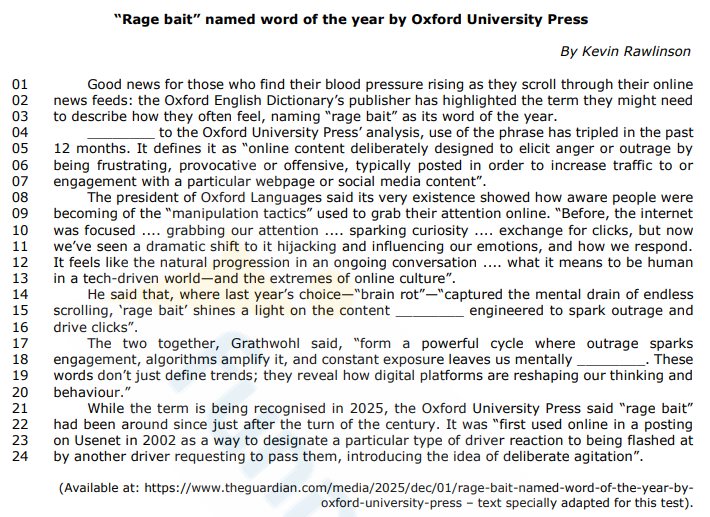Questões de Concurso
Filtrar
4.219 Questões de concurso encontradas
Página 30 de 844
Questões por página:
Questões por página:
Disciplina:
Inglês
mostrar texto associado
What is the role of UNESCO World Heritage in the history of Stonehenge?
Concurso:
Prefeitura de Jaguari - RS
Disciplina:
Inglês
mostrar texto associado
According to the text, what concern is highlighted by choosing “rage bait” as the word of the year?
Concurso:
Prefeitura de Jaguari - RS
Disciplina:
Inglês
mostrar texto associado
Analyze the following statements and mark T, if true, or F, if false, considering the context of occurrence in the text.
( ) The expression “shines a light on” (l.15) means to clarify or draw attention to something.
( ) The word “traffic” (l.06) refers to the flow of visitors or interactions on a website and may be considered a false cognate in Portuguese.
( ) The word “shift” (l.11) could be replaced by “change” without altering meaning.
( ) The verb “spark” (l.15) is used in its literal sense of producing a flame or ignition.
The correct order of filling in the parentheses, from top to bottom, is:
( ) The expression “shines a light on” (l.15) means to clarify or draw attention to something.
( ) The word “traffic” (l.06) refers to the flow of visitors or interactions on a website and may be considered a false cognate in Portuguese.
( ) The word “shift” (l.11) could be replaced by “change” without altering meaning.
( ) The verb “spark” (l.15) is used in its literal sense of producing a flame or ignition.
The correct order of filling in the parentheses, from top to bottom, is:
Concurso:
Prefeitura de Jaguari - RS
Disciplina:
Inglês
mostrar texto associado
According to the text, analyse the statements below:
I. In “reshaping” (l.19), re- is a prefix meaning again, the same as in “recognize”.
II. The modal verb “might” (l.02) expresses certainty that people will use the term “rage bait” to describe how they feel.
III. The sentence “‘rage bait’ had been around since just after the turn of the century” (l.21-22) uses the past perfect to indicate that the term already existed before another point in the past.
Which ones are correct?
I. In “reshaping” (l.19), re- is a prefix meaning again, the same as in “recognize”.
II. The modal verb “might” (l.02) expresses certainty that people will use the term “rage bait” to describe how they feel.
III. The sentence “‘rage bait’ had been around since just after the turn of the century” (l.21-22) uses the past perfect to indicate that the term already existed before another point in the past.
Which ones are correct?
Concurso:
Prefeitura de Jaguari - RS
Disciplina:
Inglês
mostrar texto associado
Mark the alternative that fills in, correctly and respectively, the dots in lines 10 and 12.

